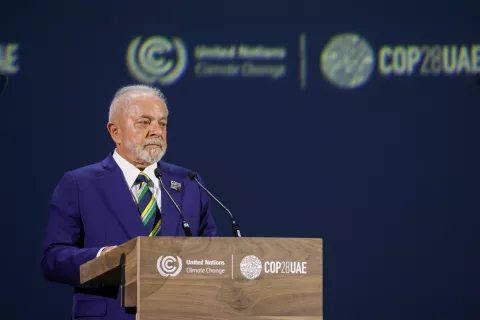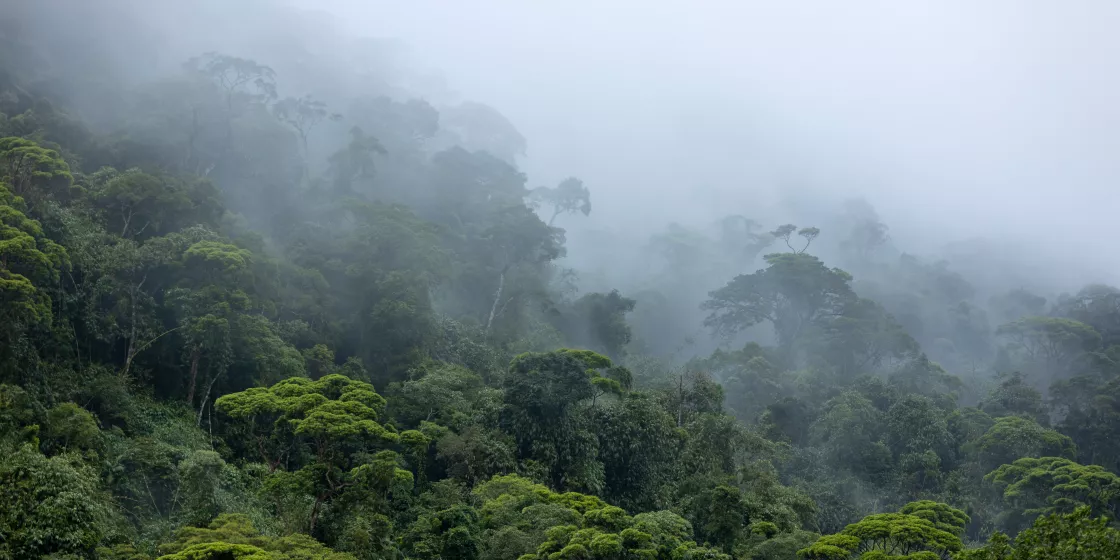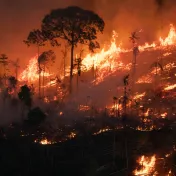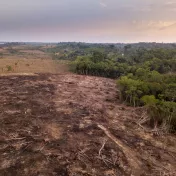Deforestation was one of the crucial issues at COP28 in Dubai. The negotiation outcome underscored its importance for the first time with a goal of ending global deforestation by 2030. Notwithstanding, deforestation continues. What exactly was decided at COP28? And where is more action needed?
The Intergovernmental Panel on Climate Change (IPCC) concludes in its sixth Assessment Report that protecting forests is one of the most effective options for tackling the climate crisis. As a strong political signal at the UN climate talks in Dubai (COP28), 190 countries have agreed in the final document that an end to deforestation is needed by 2030 to combat climate change.
Deforestation and forest degradation should be curbed through financial resources, technology transfer, capacity building, and know-how. Germanwatch welcomes that measures against deforestation should be socially equitable, serve sustainable development, and support efforts to combat poverty. We also applaud the emphasis on the importance of ‘ensuring the integrity of all ecosystems’ – reaching beyond the matter of forests. However, it should be viewed critically that Parties call for zero-carbon or low-carbon fuels, as this could result in deforestation to make room for biofuel crops.
Introducing new initiatives against deforestation
Brazil has introduced the Tropical Forest Forever Fund (TFFF) for the preservation of tropical rainforests worldwide. The concept envisages that the 80 countries with tropical rainforests present their financial requirements for the protection of biomes to the industrialised countries and receive a fixed annual price per hectare of protected or restored forest. To gain access to the fund, countries must demonstrate that their deforestation rate falls below a given threshold and that they have a transparent mechanism for resource allocation and a reliable method for measuring forest area. The larger part of the fund is intended to benefit those who contribute to the preservation of the forest. Brazil invited the rainforest countries to participate in the final design of the fund. Initially, sovereign wealth funds and private investors will finance USD 250 billion, including from the oil industry. We applaud this results-oriented approach, as it could allow for social and economic development in the region, if organised accordingly.
At COP28, the UK announced the publication of its secondary legislation for a new due diligence law. It will ban the use of palm oil, cocoa, beef, leather, and soy produced on illegally deforested land. However, other supply chains of raw materials with a high risk of deforestation, such as coffee, rubber, and maize, are not affected by the legislation. In addition, deforestation could spread and worsen due to products originating from countries where deforestation is legal for raw materials production.
Furthermore, the EU, Germany, the Netherlands, and France presented the launch of a new global Team Europe Initiative (TEI) for deforestation-free supply chains to promote partnerships with producing countries. Germanwatch very much welcomes this new initiative. New funding of EUR 70 million has been pledged for implementation. Germany will contribute around EUR 13 million in the first phase. Upon request, partner countries will receive support in the transition to sustainable, deforestation-free, and legal supply chains.
At COP28, eight major soy traders, including ADM, Bunge, Cargill, COFCO, and Olam, made a commitment to end deforestation for their soy production by 2025 and to stop converting natural ecosystems in the Amazon, Cerrado, and Chaco by 2030. However, this allows them to continue converting and damaging other natural ecosystems, such as the non-forest vegetation in the Cerrado savannah until 2030. In order to bring their production in line with the Paris Agreement’s goal of holding global warming well below 2°C and ideally to 1.5°C, other endangered biomes in South America such as the Pampa, the Mata Atlântica, or Chiquitano in Bolivia would also have to be included.
Financing commitments against deforestation
The UN Environment Programme (UNEP) and Global Canopy presented their report State of Finance for Nature. The report reveals the direct negative impacts on nature of almost USD 7 billion annually in government subsidies and private investments. In fact, financing that harms nature outweighs spending that promotes nature by more than 30:1. If the COP28 agreement is to make a real difference, governments and private finance must urgently redirect the USD 7 billion to make a difference.
At the same time, multiple financing commitments against deforestation were made that point into the right direction. One example was the announcement by the 16 signatories of the Innovative Finance for the Amazon, Cerrado and Chaco (IFACC) initiative to provide USD 4.6 billion for sustainable business models for soy and beef production without further land conversion.
Germany, Norway, and the UK announced up to USD 34 million to protect critical areas in the Colombian Amazon from deforestation and promote sustainable local economies. Norway will support Indonesia with USD 100 million to back its efforts to reduce deforestation.
The Forest & Climate Leaders’ Partnership (FCLP), an alliance of governments, civil society actors, and businesses committed to ending and reversing forest loss by 2030, presented packages for the protection of forests, climate, and nature with Colombia, the Democratic Republic of Congo, Ghana, and Papua New Guinea, which receive support by public, private and civil society partners.
Successes in the fight against deforestation
Rainforest countries such as Belize, the Central African Republic, Congo, Gabon, Madagascar, and Namibia absorb more carbon dioxide through their forests than they emit. While 93% of Suriname’s rainforests are still intact, Guyana, the country with one of the lowest deforestation rates in the world, is ensuring that indigenous peoples and people living in forest areas are part of the solution. According to government statistics, deforestation in Brazil has decreased by 20% since Lula took office. Colombia was able to reduce the loss of primary forest in the Amazon region by 69% in 2023. Indonesia recorded the lowest deforestation in 20 years in 2023. Malaysia reduced the loss of primary forests by 70% between 2014 and 2020. Palm oil is no longer the cause of deforestation in these countries.

Source: UN Climate Change, CC BY-NC-SA 2.0
Brazilian President Lula da Silva at COP28. Will he try to deliver permanent protection of biomes that are important for climate protection, beyond the Brazilian rainforest?
These improvements notwithstanding, deforestation has increased globally. In the last two years alone, almost eight million hectares of primary forest were lost worldwide. In the Amazon states, 911,740 hectares of primary forest were cut down in 2023. Brazilian ecologists warn that the Amazon rainforest is reaching a tipping point with a loss of 20 to 25% of biodiversity and deforestation. Despite successes at the local level, we still need massive global efforts to ensure the preservation of primary forests and minimise forest loss.
Brazil’s commitment to protecting forests
At the climate conference in Dubai, Lula reaffirmed his promise to end deforestation in Brazil by 2030. However, it remained unclear whether his pledge referred exclusively to illegal deforestation, whether it included the entire Amazon region or even extended to the entire country.
Brazil reaffirmed its commitment to respecting the rights of indigenous peoples at COP28. Nevertheless, the legalisation of illegal land claims on state-owned land in Brazil continues. At the same time, the country carrys on with infrastructure projects such as the BR-319 and its secondary roads, paving the way for deforestation of large parts of the Amazon forest.
As the host of the UN climate talks 2025, Brazil will welcome the international community in the city of Belém. Located in the Amazon, this COP will likely see a bigger focus on deforestation. By then, Brazil’s Tropical Forest Fund should be operational, its financing mechanism for forest protection.






